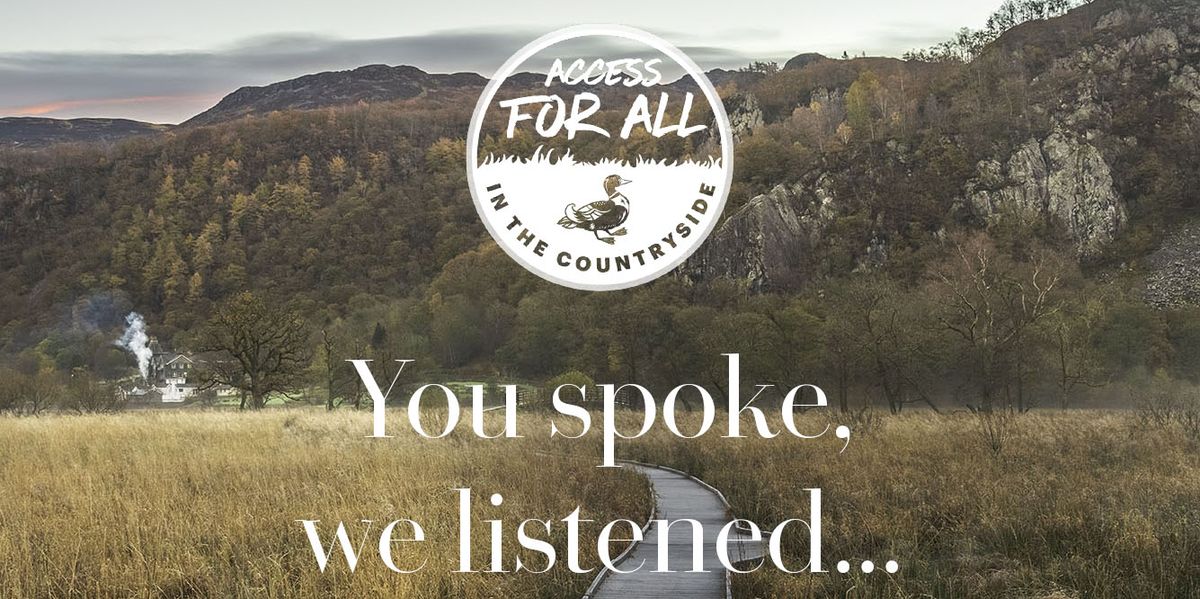Of the 140,000 miles of footpaths in England and Wales, only a few hundred are accessible to everyone – in fact, new research from Country Living UK has found that one in five people regularly face access issues when visiting green spaces.
We believe that everyone with a disability should have the opportunity to enjoy as many green spaces as possible, and for our Access For All campaign we spoke to over 1,000* people who have a disability, or who care for people with a disability.
Our research found that green does not necessarily mean permission: almost 70% of respondents (68%) said they have trouble accessing the countryside due to mobility issues, while 20% always have access issues.
“We are often disappointed when something we think is accessible turns out not to be so from an able-bodied perspective,” one respondent said.
Going out requires careful planning, with 93% saying they do extensive preparation before going for a walk, and 71% always check their route online before heading out due to common obstacles such as fences, stairs, cattle fences, narrow gates and narrow bridges.
Another added: “What to many is simply a trip becomes like a meticulously orchestrated military exercise.”
“What to many is simply a trip becomes a meticulously orchestrated military exercise.”
Country life
Key findings from the survey include:
83.2% say access to green space is very or extremely important 88% live within 30 minutes of a green space and 96% live within an hour Maps are essential for anyone going to the countryside Those under 44 seem to be slightly more affected than those over 45 51% would like to receive walking route recommendations from others in a similar situation
As part of the survey, respondents were asked about the most common barriers in rural areas, including:
23% Uneven ground 16% Steps 14% No rest areas/seats 7% No disabled toilets 6% Gates, fences, barriers 
Picasa // Getty Images
Access to green space is crucial for everyone, but many respondents said there are many challenges along the way. The most challenging green spaces are:
Hills and mountains (63%)Forests (45%)Coasts and beaches (42%)Public footpaths (34%)Agricultural land (29%)
Thirty-four percent of respondents said public sidewalks were the least accessible green space. “I don’t expect paved sidewalks because they don’t fit the landscape, but I think people with disabilities are an afterthought for many planners,” commented one participant.
“I don’t want to see paved roads that don’t fit the landscape, but I think disabled people are an afterthought for a lot of planners.”
Wheelchair users also noted that winter weather makes it difficult to get around, with 74% saying heavy rain was one of their biggest weather obstacles, along with snow, ice, lightning and strong winds.

Francesca Leslie // Getty Images
The second most commonly encountered accessibility barrier (after uneven road surfaces) is a lack of rest areas: a whopping 92% of people plan pubs, cafes and pit stops along the way, and of those, 87% research the facilities before setting off, while 46% say a lack of disabled toilets is an accessibility barrier.
“Simple things like benches, bird hides, and places to stop frequently make a big difference,” said one study participant. Another explained, “Having a place to rest every now and then is really helpful. I’m not too fussy about it – an upturned log in the woods will do, but a bench is more comfortable and safer.”
Nonetheless, survey participants said route planning maps were helpful when finding accessible walking trails. The best maps were AllTrails, Waze, TFL/AtoZ, and Miles Without Stiles.
When asked which organisations they found most supportive, the National Trust (43%), local councils (17%), RHS (16%), English Heritage (15%) and the Wildlife Trust (10%) topped the list, but 38% said they could not find any supportive organisations.

Photo credit: Ti//Getty Images
Respondents also cited sitting in nature (72%), walking/moving (66%), people-watching (50%), picnicking (34%) and birdwatching (32%) as their favourite outdoor pastimes, with 80% saying they visit the countryside to improve their mental health.
“People with disabilities who spend a lot of time indoors need green space more than anyone else.”
“People with disabilities who spend a lot of time indoors need green space more than anyone else.”
What needs to change to improve accessibility?
Improving access would give more people the opportunity to connect with the natural environment and enjoy our beautiful countryside. Respondents shared what they think would be most helpful in improving access, including:
More seating along walking routes More handrails Advance information Replacement of step stools More ramps and fewer steps More toilets for disabled people No gravel paths Providing and nearby disabled parking More staff/volunteers to answer questions
“I would like to see more wheelchairs that are light, all-terrain and accessible without damaging the vehicle,” said another respondent, while another explained that “more thoughtful planning of parking to allow disabled people the quickest and smoothest way to the observation deck would be a good start for change.”
In future issues we will feature many inspiring stories from countryside lovers facing restricted mobility, provide details of support across the UK for those looking to access green spaces, and produce practical, useful content such as maps of accessible walks to help everyone access the joys of the British countryside.
If you’d like to share your personal experience with us, get in touch with us on Instagram. Your story will help shape our campaign and what we can achieve.
*Source: Country Living Accessibility Survey July 2023
We want to hear from you
If you have any suggestions, experiences, ideas, accessibility projects or anything else you’d like to share, we’d love to hear from you!
Email: [email protected]
Social: Tag @countrylivinguk on social media and use #accessforall.
Address: Country Living, House of Hearst, 30 Panton St, Leicester Square SW1Y 4AJ

